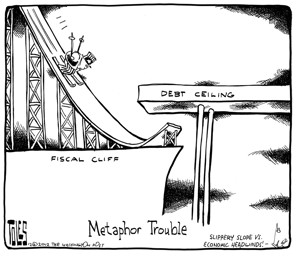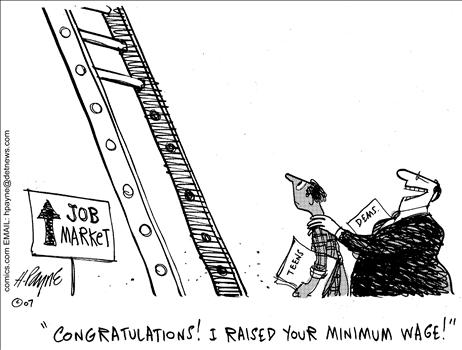http://www.youtube.com/watch?v=RRDSj62tlvQ
Month: March 2013
Children and Their Prized Possessions
This is a rare combination of endearing and thought-provoking. It’s a photo essay of little kids with their prized possessions. The kids come from Italy, Botswana, Morocco (above), the US, Haiti, Zanzibar, and more. Here they all are.
Marty Feldstein: Time to Cap Tax Deductions
In an editorial for the Washington Post, respected tax economist Martin Feldstein lays out a plan for helping to balance the budget that is so sensible and effective it has little chance of survival in Washington. (I called him “Marty” because that’s what Joel Slemrod, one of my professors at Michigan, always called him.) The plan is simple: instead of trying to eliminate the major tax expenditures (like the mortgage interest deduction), just cap them. He suggests a cap that is based on a percent of AGI (adjusted gross income, which is roughly speaking the amount you start from when calculating what you owe in taxes). This would spread the impact of the cap across all tax payers, but of course the rich would pay much more because they have a much higher AGI.
The plan would raise about $140billion in 2013. By contrast the President’s plan–which is also based on limiting tax expenditures but focuses only on those who make more than $200,000–would raise about $21 billion. Over the next 10 years, Feldstein’s plan would raise $2.1 trillion. President Obama’s would raise $300billion. Feldstein claims that the Obama plan isn’t fair, but I don’t think that’s the strongest argument. The stronger argument is that there’s only but so much cash you can raise if you focuse on the rich. Households making more than $200,000 / year are just a small fraction of the population, and if you include only individuals making $200,000 / year there just aren’t enough of them to raise significant revenue. That should be obvious from the numbers: Feldstein’s plan raises 7 times the revenue, but it does so by applying the tax to about 30 times the population: in other words, the rich still pay much more per-person on Feldstein’s (which is as it should be). Feldstein’s plan is also fair because, by capping deductions, it specifically limits the rich from being able to use expensive attorneys to circumvent the tax code.
The plan should be palatable to both parties. For the Republicans: it moves us towards a balanced budget without increasing tax rates. For Democrats: it increases revenues and makes the tax code more fair (by preventing the rich from being able to avoid taxation). I also like it because a cap on deductions is a necessary first step towards eliminating deductions. I’m not sure if all deductions should be eliminted (Feldstein specifically exempts charitable giving, for example), but most of the big ones (mortgage interest and health care) absolutely should be eliminated. Eliminating the deductions all at once would be too traumatic to our economy, but capping them is a great first step in moving towards a gradual elimination.
Emma Watson Is Really Not Doing 50 Shades (No, Really)
 She denied the rumors as far back as August saying: “I haven’t read the book, I haven’t a read a script, nothing.” Apparently that was not clear enough for some folks, so yesterday she tweeted:
She denied the rumors as far back as August saying: “I haven’t read the book, I haven’t a read a script, nothing.” Apparently that was not clear enough for some folks, so yesterday she tweeted:
Who here actually thinks I would do 50 Shades of Grey as a movie? Like really. For real. In real life.
Emma rocks. (Vulture)
Now That I’ll Be Living At Home Again…
For the last 8 months I’ve been leaving my family every Sunday evening to drive 3 hours away (more, if there’s traffic) for work. Then, on Friday afternoon, I’d turn around and come home. If traffic was good, I’d get to see my kids on Friday evening before they went to sleep. If not, I’d only have 2 days every week with my kids, and just a couple hours more with my wife.
I recently accepted a new job, one that is only about an hour from home and where I’ll even be able to work from home a couple of days a week, and I’m understandably thrilled.
I think it’s cause for celebration, and I think this is how I’m going to celebrate:
That’s right: an all-in-one breakfast sandwich maker.
In case you’re wondering why I’d ruin a perfectly sentimental piece about how much I love my family with an advertisement for small kitchen appliances, I’ll just point this out: I would have no interest in buying this for myself while I’m living alone during the week. I could never enjoy the delicious morning goodness which it proffers alone. I’ll be making assorted breakfast sandwiches for my wife because I’m a morning person and she is not. (I think she views delicious breakfast as a consolation prize for getting out of bed.) I’ll be trying to make them for the kids (although we’ll see how that goes over). And yeah, I’ll be making them for myself, but they will only be delicious because I’m eating them with my family.
See? Even small kitchen appliances can be sappy.
(If only they made one that did two at once…)
National Review on the Friend or Foe Website
Today’s turning out to be a busy news day, but I can’t not post about my good friend Chris Walsh’s awesome website Friend or Foe getting its own piece in the National Review. As the NR piece says:
He started the website Friend or Foe in 2009 to keep track of where he could shop and eat without running afoul of business policies and local regulations… Walsh’s website is an Angie’s List for Second Amendment advocates.
The site has 11,000 rankings already, and I’m sure that a prominent article in the National Review is going to lead to a lot more soon. I hope Chris has good hosting! I didn’t contribute any rankings when he was getting the site off the ground a few years ago (sorry, Chris), but as the density of reviews increases and as I no longer work where weapons are prohibited for me every day I know I’ll be another grateful user of the site.
New T&S Post: Theology, Worship, and Chidlren’s Games
My Monday morning Mormon madness continues with the most recent post for Times And Seasons. Last weeks’ post was pretty dense with margon (Mormon jargon), but this post should be much more accessible to my non-Mormon readers. (Maybe I’ll concoct some kind of metric for Mormon inscrutability to provide in future…)
Anyway, go read it! :-)
(I’m turning off comments here so y’all can post there if you have words to add.)
NPR: What Do Changes to Mormon Scriptures Mean?
 If you haven’t heard, the Church of Jesus Christ of Latter-day Saints (aka Mormons) released an update to their scriptures. The vast majority of the changes were typographical, but there were some changes that might point at much more significant developments. NPR decided to ask an expert about this, and so they called Terryl Givens. (That’s my dad, and yeah, I’m proud.)
If you haven’t heard, the Church of Jesus Christ of Latter-day Saints (aka Mormons) released an update to their scriptures. The vast majority of the changes were typographical, but there were some changes that might point at much more significant developments. NPR decided to ask an expert about this, and so they called Terryl Givens. (That’s my dad, and yeah, I’m proud.)
Also, my dad says that the last quote in the article doesn’t reflect what he was trying to say. Here’s the quote, as he stated it in the interview:
In many ways, what we’re seeing with these changes is the privileging of history over theology in some ways,” he says. “It’s a kind of acknowledgement that the Mormon Church is rooted in a past that is replete with historical claims. And it’s a magnificent thing for a church to allow professional historians to have a lead role in the way that scripture is presented and its story is told.
Here’s what he would have liked to have said:
In many ways, what we’re seeing with these changes is the privileging of history over folklore in some ways,” he says. “It’s a kind of acknowledgement that the Mormon Church is rooted in a past that is replete with historical claims. And it’s a magnificent thing for a church to allow professional historians to have a lead role in the way that scripture is presented and its story is told.
In short: the historical ban that prevented black Mormons from receiving the priesthood never had a solid theological foundation to begin with. It arose from racist attitudes that were prevalent throughout the nation at that time (mid-1800s). It’s tragic that it took so long to repudiate, and it never reflected Mormon theology.
Miami Herald: Evolution of Mexican Vigilantes
I have been getting daily emails from Foreign Policy magazine that I don’t read, and I was about to cancel them, when instead I decided to read one instead. Glad I did! There were lots of interesting international news stories I wouldn’t usually hear about, and this was the one that caught my eye the most: Mexican vigilantes set aside masks, checkpoints (Miami Herald).
Did you know that there were masked Mexican vigilantes armed with old, small-caliber weapons (Mexico has tight gun-control laws, so only the cartels and police are well-armed) had been setting up their own checkpoints to try and combat crime? I did not. It makes a lot of sense, though. Read the whole article for a description of the history, nature, and future of Mexico’s diverse and controversial vigilante groups. (Image from FoxNews.)
Bryan Caplan: Why Minimum Wage Is Still A Bad Idea
 I’ve been a huge fan of Bryan Caplan since “The Myth of the Rational Voter” fundamentally changed the way I think about politics, voting, and democracies. I still haven’t read “Selfish Reasons to Have More Kids”, but I can’t wait to get started. In the meantime, however, here is an excellent article from Caplan about the conflict between theory and empiricial research when it comes to minimum wage laws. The article is great, but also a bit loaded with econ-jargon, so I’ll try to summarize.
I’ve been a huge fan of Bryan Caplan since “The Myth of the Rational Voter” fundamentally changed the way I think about politics, voting, and democracies. I still haven’t read “Selfish Reasons to Have More Kids”, but I can’t wait to get started. In the meantime, however, here is an excellent article from Caplan about the conflict between theory and empiricial research when it comes to minimum wage laws. The article is great, but also a bit loaded with econ-jargon, so I’ll try to summarize.
Economic theory says that when you increase the cost of something people buy less of it. This is pretty fundamental. (Bryan Caplan calls it “a strong prior”, meaning an initial belief that is solidly held.) If that’s true, then when you implement a minimum wage (raising the price of hiring people), companies will buy less of it (hire fewer workers). Theroetically, this is open-shut: minimum wage laws take jobs away from people who would otherwise have them. It’s like a wealth-transfer from the very-poorest to the almost-as-poor.
Empirical evidence, however, has not found a strong relationship between minimum wage laws and unemployment. So there’s a conflict. Bryan’s piece argues that we should go with the theory instead of the evidence… sort of.
First, he points out the social science evidence is not up to the standard of, say, physics. There are no repeatable experiments, data is missing or hard to measure, and the relationship between cause and effect is often impossible to identify because we’re not talking about gas particles interacting, we’re talking about people interacting. This means everyone has a plan, everyone is guessing what everyone else is doing, and so people don’t necessarily react the way you’d think they would.
Second, and probably more persuasively for people who haven’t studied econometrics, he argues that a lot of evidence does support the idea that minimum wages lower employment. You just have to look at related fields. Caplan considers 4:
- Research on the impact of low-skilled immigration shows that lots of new workers (big increase in supply) leads to a small change in wages (small decrease in price). This relationship is called “highly elastic”, and it implies that if the government mandates small changes in price (minimum wage laws) there will be large changes in the supply (the number of people who get jobs).
- Research on European labor laws shows that lots of costly laws designed to protect workers create very high unemployment numbers. Increasing minimum wage is just one variety of the kinds of government regulation that increase labor costs, so its reasonable to have the same impact.
- Research on other kinds of price control (e.g. rent control) show the same kind of effect: if the government enforces price floors or price ceilings you can expect strong effects in the marketplace.
- Keynesian economists believe that one cause of unemployment is price-rigidity in wages. If a company needs to save money, it will usually lay of 10% of the company rather than give the entire company a 10% pay cut. This is an example of price-rigidity in wages: they just don’t go down very often. As a result, if the value of a workers input falls, usually their wages won’t fall. They will just lose their job. This is part of how Keynesian economics explains unemployment during recessions. But the same basic function is at play when minimum wages are hiked: the value of the workers input relative to their output falls. So, by their own logic, shouldn’t unemployment rise?
I also really like the conclusions Caplan draws from all of this:
From the standpoint of public policy, the minimum wage is a symbol of the view that “feel-good” policies are viable solutions to social ills: “Workers aren’t paid enough? Pass a law so employers have to pay them more. Problem solved.” From the standpoint of social science, the minimum wage is a symbol of the myopic view that you can become an expert on X by reading nothing but the leading research that explicitly addresses X: “Does the minimum wage reduce employment? Read the top papers on the minimum wage. Problem solved.”






